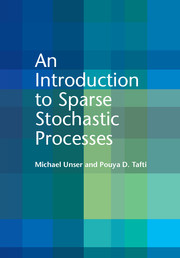Book contents
- Frontmatter
- Dedication
- Contents
- Preface
- Notation
- 1 Introduction
- 2 Roadmap to the book
- 3 Mathematical context and background
- 4 Continuous-domain innovation models
- 5 Operators and their inverses
- 6 Splines and wavelets
- 7 Sparse stochastic processes
- 8 Sparse representations
- 9 Infinite divisibility and transform-domain statistics
- 10 Recovery of sparse signals
- 11 Wavelet-domain methods
- 12 Conclusion
- Appendix A Singular integrals
- Appendix B Positive definiteness
- Appendix C Special functions
- References
- Index
Preface
Published online by Cambridge University Press: 05 September 2014
- Frontmatter
- Dedication
- Contents
- Preface
- Notation
- 1 Introduction
- 2 Roadmap to the book
- 3 Mathematical context and background
- 4 Continuous-domain innovation models
- 5 Operators and their inverses
- 6 Splines and wavelets
- 7 Sparse stochastic processes
- 8 Sparse representations
- 9 Infinite divisibility and transform-domain statistics
- 10 Recovery of sparse signals
- 11 Wavelet-domain methods
- 12 Conclusion
- Appendix A Singular integrals
- Appendix B Positive definiteness
- Appendix C Special functions
- References
- Index
Summary
In the years since 2000, there has been a significant shift in paradigm in signal processing, statistics, and applied mathematics that revolves around the concept of sparsity and the search for “sparse” representations of signals. Early signs of this (r)evolution go back to the discovery of wavelets, which have now superseded classical Fourier techniques in a number of applications. The other manifestation of this trend is the emergence of data-processing schemes that minimize an l1 norm as opposed to the squared l2 norm associated with the traditional linear methods. A highly popular research topic that capitalizes on those ideas is compressed sensing. It is the quest for a statistical framework that would support this change of paradigm that led us to the writing of this book.
The cornerstone of our formulation is the classical innovation model, which is equivalent to the specification of stochastic processes as solutions of linear stochastic differential equations (SDE). The non-standard twist here is that we allow for non-Gaussian driving terms (white Lévy noise) which, as we shall see, has a dramatic effect on the type of signal being generated. A fundamental property, hinted in the title of the book, is that the non-Gaussian solutions of such SDEs admit a sparse representation in an adapted wavelet-like basis. While a sizable part of the present material is an outgrowth of our own research, it is founded on the work of Lévy (1930) and Gelfand (arguably, the second most famous Soviet mathematician after Kolmogorov), who derived general functional tools and results that are hardly known by practitioners but, as we argue in the book, are extremely relevant to the issue of sparsity.
- Type
- Chapter
- Information
- An Introduction to Sparse Stochastic Processes , pp. xiii - xivPublisher: Cambridge University PressPrint publication year: 2014



